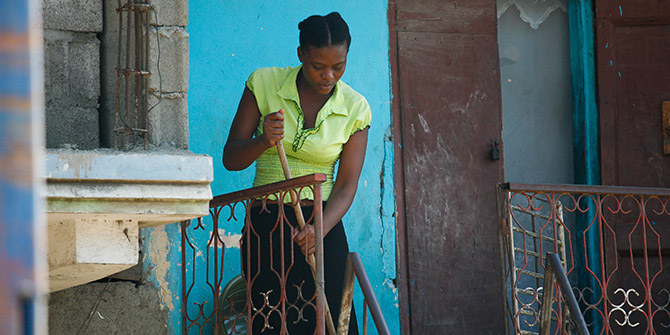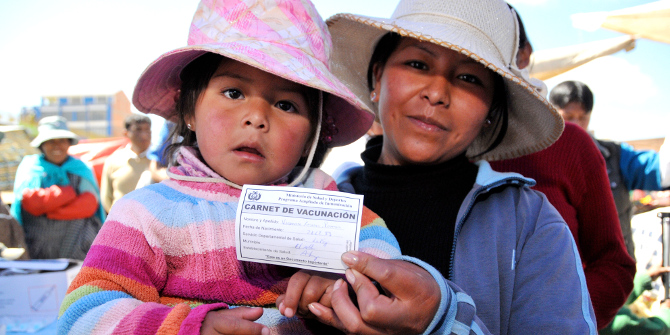 Achieving labour rights for domestic workers requires comprehensive legislation and concrete implementation mechanisms, but public exposure of long-obscured discrimination and abuse can play an important role in shaping mindsets and changing the law, writes Simca Simpson Lapp (Queen Mary University of London).
Achieving labour rights for domestic workers requires comprehensive legislation and concrete implementation mechanisms, but public exposure of long-obscured discrimination and abuse can play an important role in shaping mindsets and changing the law, writes Simca Simpson Lapp (Queen Mary University of London).
The release of Alfonso Cuarón’s film Roma has sparked unprecedented debate about paid domestic work in Latin America. Cleo, a live-in domestic worker, is the central protagonist of the film, which depicts the life of an upper middle class Mexican family in the 1970s.

Visibility and labour rights
The attention garnered by Roma is credited with helping to advance the longstanding rights claims of domestic workers in Mexico. And indeed any production or media coverage that sheds light on the experiences of domestic workers can serve as an important tool for realising labour rights in practice. This is true even in countries such as Uruguay and Argentina where legislative advances have significantly expanded rights guarantees for this long-excluded segment of the workforce.
In accepting the Oscar for Best Director, Cuarón thanked the Academy for “recognising a film centred around an indigenous woman, one of the 70 million domestic workers in the world without work rights, a character that had been historically relegated to the background in cinema.” In the director’s own words, in Roma he “looked where others don’t.”
But for all its cinematographic mastery, the film has also been criticised for perpetuating the naturalisation of oppression and failing to give Cleo a voice.
In truth, its storyline does not depict an explicit struggle for rights. Rather, it exposes the realities of the physical toil and complex emotional labour carried out by domestic workers in contexts of high socio-economic equality, and often racial discrimination.
Mexican rights activist and former domestic worker Marcelina Bautista articulated the significance of seeing Cleo’s life depicted on the big screen, saying:
“Many of us see ourselves reflected in Cleo’s role… Many of us feel like we are Cleo. And we feel like Cleo… But, we do not want to be Cleo.”
From visibility to regulation
Far from shunning the film, groups that have worked for many years to advance domestic workers’ rights in Mexico and the United States have seized on this new source of visibility to advance their struggles for national regulatory changes. Bautista was one of three domestic workers’ rights activists who attended the Oscars as guests of the director and used the event as a platform for their cause.
These activist groups also played a key part in bringing international labour standards for domestic workers to Mexico in 2011. It had long been argued that paid domestic could not be regulated because it takes place in the private sphere of households. The passing of the International Labour Organisation’s Convention on Decent Work for Domestic Workers was a watershed moment in terms of overturning this exclusionary paradigm. The Convention codified maximum working hours, rest provisions, and other labour norms, as well as holiday entitlement and social security provisions.
Mexico signed the Convention in 2011, but it has yet to be ratified. Roma may be helping to change that.
The morning after the 2019 Academy Awards ceremony, where the film won a number of Oscars, Mexico’s President Andrés Manuel López Obrador claimed in an interview that his administration is working towards the ratification of Convention 189. Soon after, further pressure for ratification emerged from the Senate, while a recent Supreme Court ruling also found that the Mexican government must establish a social security system for domestic workers, providing even greater momentum towards ratification and implementation.

Domestic workers’ rights beyond Mexico
In wider Latin America and even further afield, Roma has reignited conversations about domestic workers rights.
The South American trio of Uruguay, Argentina, and Brazil were amongst the central state supporters of Convention 189 when it was first created. My own research in Montevideo, Uruguay, and Buenos Aires, Argentina, examined how the Convention and national legislation, passed in 2006 and 2013 respectively, were implemented on the ground.
The implementation trajectories that I observed demonstrated the power of legal instruments to transform even forms of exploitation long-ingrained in domestic-work labour relationships. However, they also point to continued challenges in implementing and enforcing such standards in practice.
In Argentina, and even more so in Uruguay, social security contribution rates have increased substantially since the adoption of new regulatory frameworks, with new policies and institutions serving to encourage and enforce compliance with labour norms for domestic workers.
In Uruguay, collective-bargaining institutions allow for negotiations between representatives of domestic-worker unions and of employers. The Ministry of Labour also carries out home inspections and imposes fines on non-compliant households.
In Argentina, some employers are eligible for income-tax deductions when they register domestic employees with social security. In addition, domestic workers in the formal sector are eligible for benefits such as discounts on public transport. A specific labour tribunal established decades ago in the City of Buenos Aires also continues to mediate complaints of rights violations from domestic workers, utilising its power to extract compensation from employers where necessary.
Some efforts to promote formalisation and protect domestic workers’ rights have also taken a digital turn. Both countries encourage electronic salary payments and provide apps to help employers calculate deductions. In Argentina, the largest domestic workers’ union also distributes a mobile phone app focused on the rights of migrant domestic workers.
Much work still to be done
While such mechanisms do contribute to implementing existing legislation, they cannot guarantee that employers and domestic workers will internalise new labour norms in their daily lives.
In fact, encouraging advances in recent years have coexisted with various non-compliant and abusive practices by employers: under-reporting hours worked, deliberately registering workers in lower-paying occupational categories, demanding that workers perform tasks beyond the scope of their role, overt deception, discrimination, and sometimes even physical or sexual violence. In this context, media coverage that brings rights violations into public view may have a role to play in uprooting tacit cultural acceptance.
In 2012, one employer from a prominent business-owning family in Uruguay was subject to legal proceedings and intense public scrutiny after it emerged that she had been employing undocumented live-in domestic workers from Bolivia in “feudal” conditions. In 2018, the Uruguayan domestic worker Mary Nuñez released a book entitled Domestics or Slaves? in which she recounted numerous cases of abuse, including many she herself had suffered.
In Argentina, meanwhile, public scandals about the mistreatment of domestic workers have even tainted prominent political figures. In 2018, a WhatsApp voice message circulated in which the Minister of Labour himself was heard to use abusive language to dismiss an informally employed domestic worker. More recently, a group of domestic workers mobilised publicly to denounce “apartheid” conditions when one bus service refused to let them ride in the same vehicles as wealthy local residents on their commute to and from their employers’ homes.
Of course, achieving labour rights also requires comprehensive legislation and concrete implementation mechanisms, but public exposure of long-obscured discrimination and abuse can play an important role in shaping mindsets and changing the law.
Aside from giving us an insight into the life of one live-in domestic worker in Mexico City, Alfonso Cuarón’s Roma shows how the lens of artistic production and the wider media media can render domestic workers’ individual and collective struggles ever more visible. This is crucial for not only for establishing rights, but also for making them a reality behind closed doors.
Notes:
• The views expressed here are of the authors rather than the Centre or the LSE
• Please read our Comments Policy before commenting





